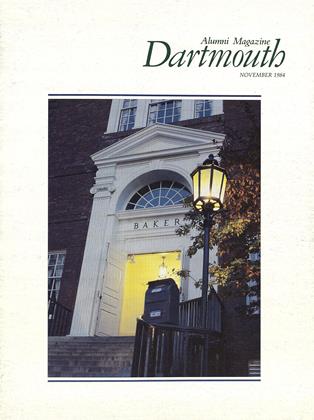The use of the Indian symbol by Dartmouth College was discontinued in 1972. In the 12 years since then, the Indian symbol has come to symbolize something else on campus controversy.
Another in a long line of "Bring back the Indian" cries was sounded in September. It came from the co-captains of the 1984 Dartmouth football team, Rich Weissman '85 and Don Pomeroy '85, who distributed a letter to members of the student body on the eve of the 1984 season, supporting the return of the Indian symbol to Dartmouth athletic teams.
"We wanted to inform students, especially the freshmen, about the tradition behind the Dartmouth Indian and what it stands for," says Weissman, a three-year starter at tailback. "Without the symbol we have nothing left as far as tradition goes. There's no rallying point."
The symbol was discontinued at the request of the College's Native American students in 1972. Representatives of the Native American students say their attitude about the symbol is the same today as it was 14 years ago.
"The use of the Indian symbol as far as we're concerned is racist, period," says Don Hebert. '75, director of the Native American Studies program at the College. All told, there are about 50 Native American students at Dartmouth this year. Alumni and students have attempted at various times since 1972 to reinstate the Indian as the College's symbol. The administration has rebuffed each attempt.
President David T. McLaughlin '54 and athletic director Ted Leland met with the football co-captains a few days after the letter was sent out. "It wasn't a hand-slapping session," says Pomeroy, a starter in the defensive secondary. "It was more of an informational session. He told us his position. He said the symbol is offensive to some Native Americans at Dartmouth and as long as that was the case the symbol wouldn't return."
Looking back, Leland wishes the two players had never sent out the letter proclaiming their support of the Indian symbol. "I think it was unfortunate," he says. "I think it was meant to unite the team and the student body, but I don't think it's going to work. Nobody could ever attack their motives, but I think it's a mistake."
Although some members of the administration frowned on the letter, Pomeroy and Weissman say they don't regret what they did. "I definitely think we opened some eyes, especially among the freshmen," says Weissman. "We wanted to show them another angle. As soon as the freshmen get here, the administration lays down the rules about not using the symbol."
The letter urged the Dartmouth community to "support actively a symbol for Dartmouth that would inspire the players and unify the student body and alumni."
The two co-captains say the letter was a "consensus of the team" and that some of the ideas expressed in the letter came from other members of the team.
The Dartmouth College Athletic Council (DCAC) started polling teams last spring about how they felt on adopting the timber wolf as the new College athletic symbol.
Pomeroy and Weissman say the football team almost unanimously rejected the timber wolf symbol and came out in favor of the Indian.
The players don't expect to see immediate results from their move to bring back the Indian. "We both realize it's going to take time/' said Pomeroy. "Nothing is going to change overnight, but I don't think it's going to fade away."
The letter was not well received by members of the Native American Studies program at the College. "It's extremely discouraging," says Hebert. "There are times when it appears the issue is going to disappear, then it resurfaces again."
Weissman and Pomeroy say they believe the Indian stands for "bravery, courage, pride, and comradery." According to Hebert, the Native Americans at the College don't consider that a compliment. "It discourages people from looking beyond the stereotype of Indians that people have here. They look at Indians as being brave and savage."
Leland was at Stanford University in the early 1970s when that school was dealing with the Indian symbol controversy. "There were some difficult times, but the attachment to the symbol wasn't as deep there as it is here."
Leading soccer scorer, Julian Okwu '87 of New Haven, Conn., makes a pass during the Green's 3-0 win over Williams.
 View Full Issue
View Full Issue
More From This Issue
-
 Feature
FeatureThe Draft: To Register or Not to Register
November 1984 By James Heffernan -
 Feature
FeatureLife After the Presidency
November 1984 By Shelby Grantham -
 Feature
FeatureHamming It Up
November 1984 By Gay E. Milius, Jr. '33 and Dick Dorrance '36 -
 Feature
FeatureGet a Job
November 1984 By Nancy Wasserman '77 -
 Feature
FeaturePractice, practice, practice
November 1984 -
 Books
BooksSo Much More
November 1984 By Peter Smith
Jim Kenyon
-
 Sports
SportsThe Berry Sports Center: "A real shot in the arm"
NOVEMBER 1984 By Jim Kenyon -
 Sports
SportsHonors for harriers
DECEMBER 1984 By Jim Kenyon -
 Sports
SportsHullah: Setting sights
DECEMBER 1984 By Jim Kenyon -
 Sports
SportsFootball roundup
DECEMBER 1984 By Jim Kenyon -
 Sports
SportsThree laxwomen make All-Ivy
June • 1985 By Jim Kenyon -
 Sports
SportsThe Man Behind the Berry Sports Center
DECEMBER • 1985 By Jim Kenyon
Sports
-
 Sports
SportsDartmouth 11, Princeton 2
March, 1926 -
 Sports
SportsSOCCER TEAM STRONG
November 1938 By "Whitey" Fuller '37 -
 Sports
SportsBig Green Teams
December 1938 By "Whitey" Fuller '37. -
 Sports
SportsWith Big Green Teams
March 1944 By Dick Gilman '45 -
 Sports
SportsTrack
July 1952 By Francis E. Merrill '26 -
 Sports
SportsHockey Valedictory
APRIL 1929 By Phil Sherman

